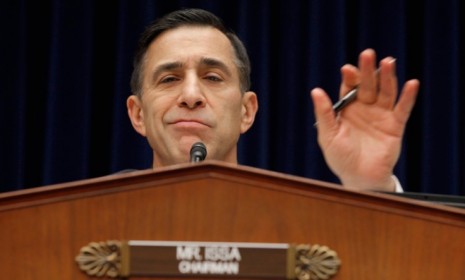Congress' contraceptives hearing: 'Where are the women?'
The GOP-led House holds a hearing on Obama's controversial contraception compromise — and the five witnesses are all men

A free daily email with the biggest news stories of the day – and the best features from TheWeek.com
You are now subscribed
Your newsletter sign-up was successful
The White House may have compromised on a new rule requiring employers to offer copay-free coverage for contraception — offering religiously affiliated employers an exemption — but the latest conflagration in the culture wars rages on. At a hearing Thursday convened by Rep. Darrell Issa (R-Calif.), five male witnesses, all religious leaders, explained why the regulation still assaults their religious beliefs. When Democrats asked Issa to invite some female witnesses, he said the debate was about religious freedom, not "reproductive rights and contraception." Before storming out, Rep. Carolyn Maloney (D-N.Y.) demanded, "Where are the women?" Was Maloney right to complain?
Obviously, women should have been invited: The committee missed the "real stories" of how this exemption affects women, law student Sandra Fluke, who was denied the chance to testify, tells The Washington Post. "My testimony would have been about women who have been affected by their policy, who have medical needs and have suffered dire consequences." It's "heartbreaking to watch" how "willing some members of our government are to play political football with women's health."
"Meet Sandra Fluke: the woman you didn't hear at Congress' contraceptives hearing"
The Week
Escape your echo chamber. Get the facts behind the news, plus analysis from multiple perspectives.

Sign up for The Week's Free Newsletters
From our morning news briefing to a weekly Good News Newsletter, get the best of The Week delivered directly to your inbox.
From our morning news briefing to a weekly Good News Newsletter, get the best of The Week delivered directly to your inbox.
But women were invited: Sure, the five witnesses on this particular panel were all men, says Kathryn Jean Lopez at The National Review. But a second panel was also scheduled to testify, and it included two women. When Maloney and two other Democrats walked out of the hearing, they missed this testimony. "But why stick around and do your job when you can get media coverage instead?"
This controversy points to a larger problem: The real issue, says Jena McGregor at The Washington Post, is "the lack of women leaders" in religious institutions and theological academia. "Roman Catholic priests cannot be women," women "cannot be ordained as Orthodox Jews," and "women continue to be a minority in the academic world as well." Is it really any surprise that no female religious leaders or college presidents were on this panel? To ensure that women sit on such panels in the future, we simply need "more women [to] reach positions of influence in academia and religious institutions."
"Absence of women at birth-control hearing prompts larger question"
A free daily email with the biggest news stories of the day – and the best features from TheWeek.com
-
 6 of the world’s most accessible destinations
6 of the world’s most accessible destinationsThe Week Recommends Experience all of Berlin, Singapore and Sydney
-
 How the FCC’s ‘equal time’ rule works
How the FCC’s ‘equal time’ rule worksIn the Spotlight The law is at the heart of the Colbert-CBS conflict
-
 What is the endgame in the DHS shutdown?
What is the endgame in the DHS shutdown?Today’s Big Question Democrats want to rein in ICE’s immigration crackdown
-
 The billionaires’ wealth tax: a catastrophe for California?
The billionaires’ wealth tax: a catastrophe for California?Talking Point Peter Thiel and Larry Page preparing to change state residency
-
 Bari Weiss’ ‘60 Minutes’ scandal is about more than one report
Bari Weiss’ ‘60 Minutes’ scandal is about more than one reportIN THE SPOTLIGHT By blocking an approved segment on a controversial prison holding US deportees in El Salvador, the editor-in-chief of CBS News has become the main story
-
 Has Zohran Mamdani shown the Democrats how to win again?
Has Zohran Mamdani shown the Democrats how to win again?Today’s Big Question New York City mayoral election touted as victory for left-wing populists but moderate centrist wins elsewhere present more complex path for Democratic Party
-
 Millions turn out for anti-Trump ‘No Kings’ rallies
Millions turn out for anti-Trump ‘No Kings’ ralliesSpeed Read An estimated 7 million people participated, 2 million more than at the first ‘No Kings’ protest in June
-
 Ghislaine Maxwell: angling for a Trump pardon
Ghislaine Maxwell: angling for a Trump pardonTalking Point Convicted sex trafficker's testimony could shed new light on president's links to Jeffrey Epstein
-
 The last words and final moments of 40 presidents
The last words and final moments of 40 presidentsThe Explainer Some are eloquent quotes worthy of the holders of the highest office in the nation, and others... aren't
-
 The JFK files: the truth at last?
The JFK files: the truth at last?In The Spotlight More than 64,000 previously classified documents relating the 1963 assassination of John F. Kennedy have been released by the Trump administration
-
 'Seriously, not literally': how should the world take Donald Trump?
'Seriously, not literally': how should the world take Donald Trump?Today's big question White House rhetoric and reality look likely to become increasingly blurred